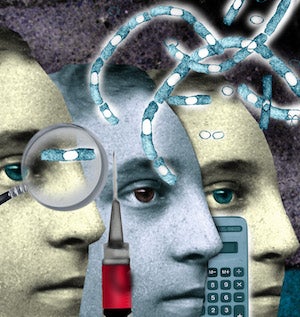LENS Business, Law and Policy
Dubious Forensics
A Legal Expert Speaks Out on the State of Courtroom Science
 IMAGE: MICHAEL MORGENSTERN/THEISPOT
IMAGE: MICHAEL MORGENSTERN/THEISPOTCrime-fighting TV detectives seem to have infinite sources of evidence: hair, ballistics, fingerprints, bite marks. But as seemingly compelling as those clues can be, they aren't science, said Paul Giannelli, JD, the Albert J. Weatherhead III and Richard W. Weatherhead Professor Emeritus of Law and a Distinguished University Professor Emeritus.
As a legal matter, that distinction between forensic analysis and rigorous science is a relatively recent concept. Giannelli said it was spelled out in both the 1993 U.S. Supreme Court ruling in the case of Daubert v. Merrell Dow Pharmaceuticals, which established that expert forensic testimony needs to show "scientific knowledge"—the kind that is tested, peer-reviewed and published in journals—and in a 2009 National Academy of Sciences report.
Giannelli has followed the field nearly his whole career, from the early 1970s as a young U.S. Army lawyer studying forensic science, through more than 40 years teaching at Case Western Reserve (he retired last year), and including his 2014 appointment to the National Commission on Forensic Science. That advisory board was tasked with improving the criminal justice system's application of forensic science. We spoke with Giannelli about his career—and why a spate of convictions based on shaky forensics have triggered a new phase of his work.*
What are the things that come across your desk that speak to the importance of your work?Sometimes I'll come across a case, or a student who's working on a paper would say, "Oh, this case cites you." Even in the Daubert case, several of my articles were cited.
And you've been quoted by the Supreme Court at least seven times.It's eight now.
What were the eventual recommendations of the National Commission on Forensic Science?We came up with a national code of professional responsibility or ethics for forensic science [which the U.S. Department of Justice accepted in 2016]. In the past, different forensic science groups had their own codes, and some of them were not very rigorous, and there wasn't much of an enforcement mechanism. Also, there are certain legal terms that the courts had used that I argued against using: For instance, a person would testify to a "reasonable scienti c certainty," which has no scienti c or legal meaning. And we wanted more pretrial exchange of information. As a lawyer, you cannot just walk in and nd out there's a scientific expert testifying against [your client]—lawyers are not trained in science, so you may need your own expert.
Do any of the cases affect you personally?Sometimes you see cases that are just so bad. There's the [Ron] Williamson case that I always cite for the hair evidence. [Williamson was convicted of murder in Oklahoma in 1988 based on hair evidence that Giannelli said was overstated; he was released in 1999, exonerated by DNA evidence]. That guy was five days from execution.
Then there's the case of Cameron Todd Willingham in Texas. [Willingham was convicted of murdering his three children via arson and was executed; questions remain about the validity of the evidence used against him.] The evidence of arson was junk science. No arson, no crime. And so, the best they could have said on the cause
of the fire is that it's undetermined. That's because they didn't know how to investigate fires, and all the other evidence in that case involved a jailhouse snitch. So yeah, that got me. You get into certain periods. Picasso had his blue period; I have my angry period.
And that's right now?That's where I am now. And that's where I've been for a number of years—when I see something like Willingham that makes me angry, I write an article. Another article I wrote dealt with the manipulation of science by law enforcement. Still another focused on crime-lab scandals. I would get passionate about it. You just want to say, "How the hell can we do this in this system?"
*The conversation was edited for length.





